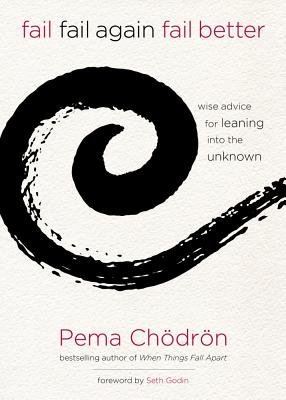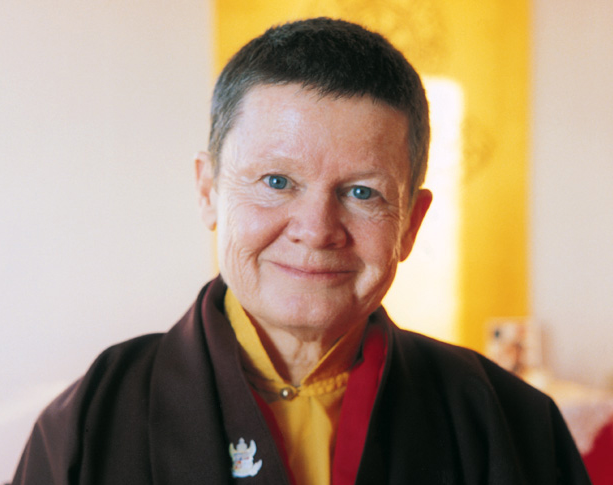I enjoy reading the occasional commencement speech, especially from authors I admire. I think my all time favorite is the one George Saunders gave at Syracuse in 2013, on kindness. I don’t usually seek out commencement addresses in print, but I made an exception for Pema Chödrön. She’s an American-born Buddhist nun, she’s incredible and wise, and her writing can be a bit life-changing.
I immediately loved her approach: she addresses how to think about and deal with failure. Commencement speeches are directed toward young people in the midst of the one of the most uncertain times of their lives. They are also (typically) in their early 20s: about to live out a decade that for most people will hold a lot of change and opportunities and … failure. Failure to land particular opportunities. Failure to know what they want to do with their lives. Failure in relationships. Failure at all sorts of things. I certainly experienced it, and I wish I had read Pema’s wisdom back then.
“I thought if there is one skill that is not stressed very much, but is really needed, it is knowing how to fail well.”
It’s such an obvious concept for a Commencement speech, and I love that she approaches it not with grandiose stories of people who failed and then went on to become incredibly successful, as meaningful as those stories are. Instead, she approaches it with matter of fact truthfulness: failure is a huge part of life, and we have to keep failing — and getting better at how we fail — in order to keep living.
“Instead of failure and regret being the seed of self-loathing, it can become the seed of compassion and empathy.”
So this transcript of her speech is wonderful to read. But the greatest thing about this little book is not the speech, it’s the second half: the Q&A between Pema Chödrön and Tami Simon, the publisher. I had to read it with a pen in hand — there was so much wisdom to star and underline. It covers the topics of failure and fear, and then layers in the core teaching of compassion and acceptance found in Buddhism.
Here’s Pema talking about fear being an open and fluid state:
“And you can also say to yourself — this is like teaching yourself the dharma on the spot — ‘Yes, this doesn’t feel good, and yes, my knees are actually trembling but I’m going to stay with this, I’m going to explore this; I’m interested in knowing this quality because it will take me in the direction I want to go, instead of back into the cocoon of shelter and ego-clinging.’
You are offered the potential of opening up into the as-yet unknown, the much bigger world where there are smells you’ve never smelled, there are sights you’ve never seen, and there are sounds you’ve never heard. What you could experience is so much vaster than what you currently experience. Let’s go in that direction.”
I don’t think the meditation and mindfulness practice that I’ve been working on the past few years would be as meaningful or successful for me without the basic understanding of Buddhism I’ve developed from reading the work of authors such as Pema Chödrön, Lodro Rinzler, and Thích Nhất Hạnh. If you’re at all curious about Buddhism, this little book is a great introduction.

Affiliate links to buy this book: IndieBound | Amazon
Add Fail Fail Again Fail Better on Good Reads.
FTC Disclosure: I received a galley copy of this book from the publisher.
Author photo by Liza Matthews.

Sounds like a lovely book on something we could all do better at. Bill Moyers used to do a TV show on PBS called Now and he had Chodron on once and of course it was a fabulous interview. I had never heard of her before then but ever since I have encountered her she has never failed in having something wise to impart.
Ohhh that sounds lovely! I’ll have to see if that’s available online, I’d love to watch her talk with Bill Moyers. You’re so right – she just radiates wisdom, and it’s wonderful to encounter.
Thanks for sharing this. I’ll take a look at it as well. It’s hard to accept that failure is a part of life and sometimes it’s hard to get past it and try again.
I agree – I think it’s something that no matter how much we’ve failed or how old we are, it doesn’t get any easier unless we can consciously start to change the way we think about it. I hope you enjoy this one too! It’s short, but packed full of wisdom.
It sounds like you’ve been getting a lot out of learning about Buddhism lately. As a perfectionist and someone who’s notoriously fearful of failure, I could do with checking this book out, especially as I embark on the big bad grad school application cycle. Fingers crossed I don’t fail, of course, but it never hurts to be prepared. :)
I really am – they’ve really been life changing, in a very positive way. The meditation side is great, and is the foundation of Buddhism, but it’s going beyond that into all the Buddhist teachings about acceptance and mindfulness that are the most powerful for me. It’s helping with my anxiety and making me an even happier person – both major positives!
I will keep my fingers crossed for you, but I doubt you need it! :) Wishing you the best of luck – when do you start to find things out… or are you still a ways away?